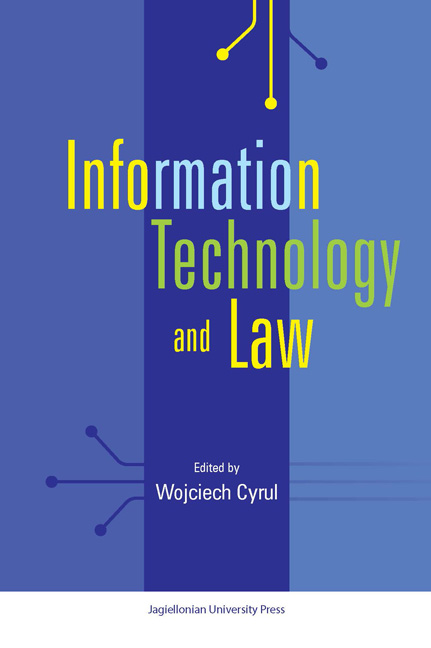Book contents
- Frontmatter
- CONTENTS
- Preface
- Chapter 1 Technological Destabilization of Law
- Chapter 2 Problems with the Storing and Presentation of Information
- Chapter 3 XML Models for Legal Documents: Current Polish Practices and International Standards
- Chapter 4 Similarity Analysis of Polish Legal Documents Using WordNets Semantic Relations
- Chapter 5 Consolidation of Legal Documents in an Electronic Format
- Chapter 6 A Three Dimensional – Code and a Question of the Normative Hyper-linking?
- Chapter 7 The Law, Labour Unions and Information Technology: Enhancing or Restricting Democracy at the Workplace
- Chapter 8 Protection of the Consumer in Digital Content Contracts
- Chapter 9 Procedure, Time and Imputation in Criminal Law
Chapter 8 - Protection of the Consumer in Digital Content Contracts
Published online by Cambridge University Press: 05 December 2014
- Frontmatter
- CONTENTS
- Preface
- Chapter 1 Technological Destabilization of Law
- Chapter 2 Problems with the Storing and Presentation of Information
- Chapter 3 XML Models for Legal Documents: Current Polish Practices and International Standards
- Chapter 4 Similarity Analysis of Polish Legal Documents Using WordNets Semantic Relations
- Chapter 5 Consolidation of Legal Documents in an Electronic Format
- Chapter 6 A Three Dimensional – Code and a Question of the Normative Hyper-linking?
- Chapter 7 The Law, Labour Unions and Information Technology: Enhancing or Restricting Democracy at the Workplace
- Chapter 8 Protection of the Consumer in Digital Content Contracts
- Chapter 9 Procedure, Time and Imputation in Criminal Law
Summary
1. Introduction
The digital revolution that has taken place over the past two decades with the gradual development of the Internet has profoundly altered the means of promoting and selling products and services offered by business entities. In these changed circumstances disputes concerning the situation relating to the use of the Internet by commercial companies are increasingly present. However, changes to the law cannot keep up with the pace of technological development. Consequently, the resolution of such disputes often requires the use of traditional legal concepts that were not originally designed for application to virtual reality. Such disputes may indeed raise questions about the meaning of such traditional legal concepts. One example which can illustrate this problem is related to consumer protection, well established in relation to contracts in the real world, but uncertain in virtual reality.
It is important to note that the consumer contract differs from other types of contracts. Usually consumer contracts are pre-drafted by one party (professional trader), without the possibility of an amendment or re-negotiation of its content. Consumer contracts are usually executed between parties with unequal market power and knowledge. This is particularly true for B2C (business-to-consumer) digital content contracts. In order to protect the consumer in B2C transactions, the separate body of law was created on the level of EU and subsequently in Member States legal systems.
- Type
- Chapter
- Information
- Information Technology and Law , pp. 127 - 140Publisher: Jagiellonian University PressPrint publication year: 2014



